Summer grab-bag, part four: (almost) all the rest
Recent events have made it harder to give the blog sustained attention. I’m still watching a lot, but often feel too distracted to pay full attention – which is frustrating because it takes a lot of the pleasure out of watching movies. For today, then, I’ll just quickly catalogue the pile of disks I haven’t found time to write about over the past few months, setting aside a few for more in-depth consideration when I can get to them.
Universal
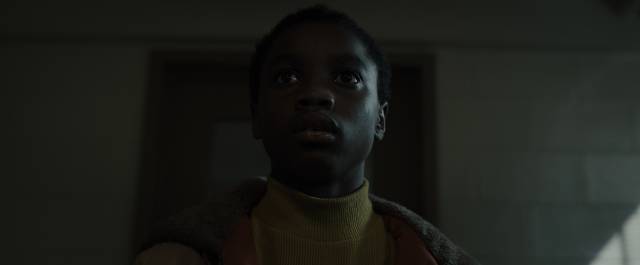 Candyman (Nia DaCosta, 2021)
Candyman (Nia DaCosta, 2021)
This sequel, co-written and produced by Jordan Peele, uses Clive Barker’s urban myth to further explore the deeply embedded effects of race in U.S. society, but now among upscale, gentrified African Americans living in glittering towers which have seemingly erased the social ills of Cabrini Green. Slow and atmospheric, with a good cast. (Deleted scenes and multiple featurettes)
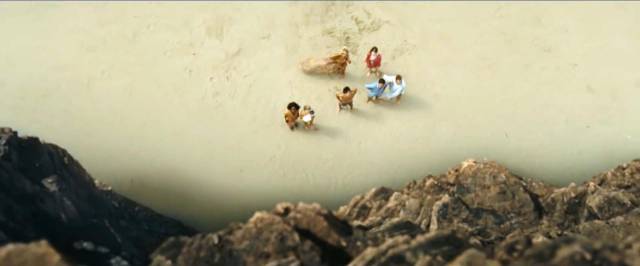 Old (M. Night Shyamalan, 2021)
Old (M. Night Shyamalan, 2021)
While there’s some structural awkwardness, Shyamalan creates an unsettling atmosphere in an idyllic setting as a group of tourists find themselves trapped on a tropical beach where they age through decades in a single day. As always, I liked this more than most people and enjoyed watching it again. (Deleted scenes and featurettes)
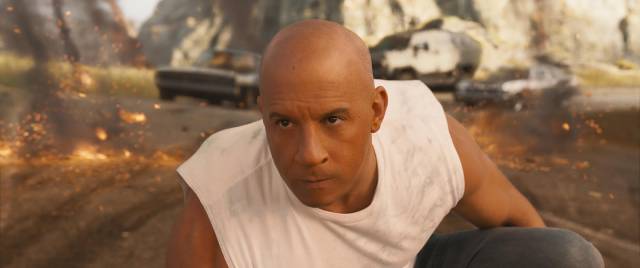 F9: The Fast Saga (Justin Lin, 2021)
F9: The Fast Saga (Justin Lin, 2021)
It’s all about family again – in this case a brother turned bad – but the action has grown so preposterously over-the-top (heading for space in a sports car to take out a satellite) that paradoxically it’s less fun to watch. (Extended cut, featurettes and commentary)
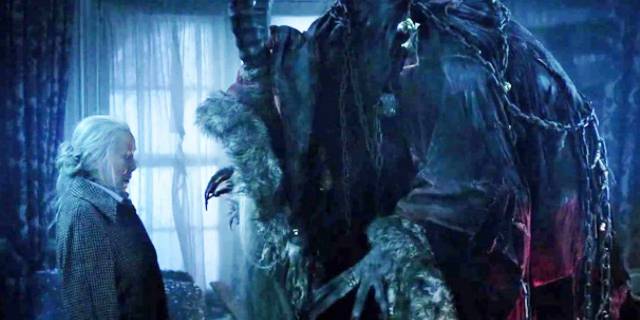 Krampus (Michael Dougherty, 2015)
Krampus (Michael Dougherty, 2015)
Anti-Christmas movies almost always end up reinforcing cliches about the season, and that’s no different as family bickering conjures the anti-Santa demon and the whole neighbourhood is overrun by occasionally creepy monsters. There’s a Tim Burtonesque quality, with sentimentality undermining a superficial air of transgression. (Deleted scenes, alternate ending, featurettes and commentary)
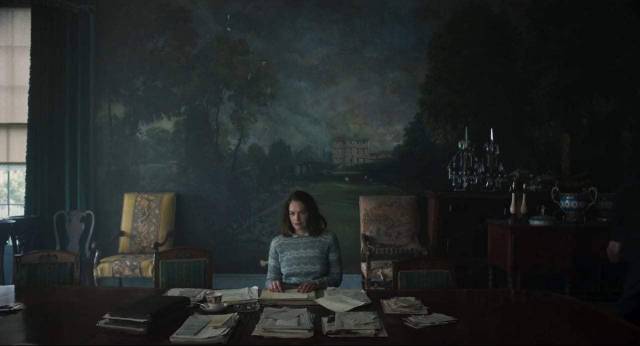 The Little Stranger (Lenny Abrahamson, 2018)
The Little Stranger (Lenny Abrahamson, 2018)
A ghost story so tasteful and restrained that it never really offers the creeping dread the material suggests. A newly-arrived doctor becomes involved with a wealthy family in decline, inhabiting a decaying estate which may or may not be haunted by an unhappy ghost. A fine cast, effectively dank visuals, but ultimately too tamped down to engage. (A couple of brief featurettes)
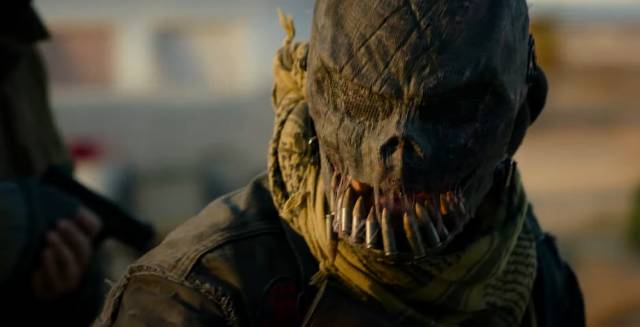 The Forever Purge (Everardo Valerio Gout, 2021)
The Forever Purge (Everardo Valerio Gout, 2021)
The yearly purge is no longer enough to satisfy a rising fascist movement, so they don’t stop when the whistle blows and continue to kill those who stand in the way of making America great again. Writer-producer James DeMonaco maintains the quality in this fifth episode, once again infusing the pulpy dystopian narrative with some pertinent political and social commentary. (Deleted scene and a couple of featurettes)
*
Warner Brothers
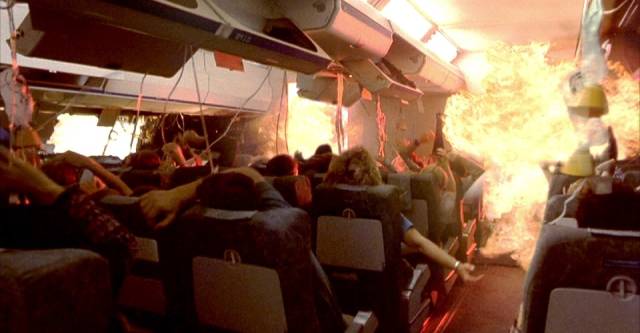 Final Destination Collection (Various, 2000-2011)
Final Destination Collection (Various, 2000-2011)
Bingeing a series like Final Destination definitely highlights diminishing returns – the mechanics are so rigid and basic that all you have to fall back on are whether the characters are engaging and how inventive their deaths are. The first movie is effective – you actually like some of the characters and the set-pieces are staged relatively plausibly – but the need to keep going further leads to some silly excesses in later episodes and, disastrously, to the replacement of practical effects with not-very-good CGI. (Commentaries and featurettes)
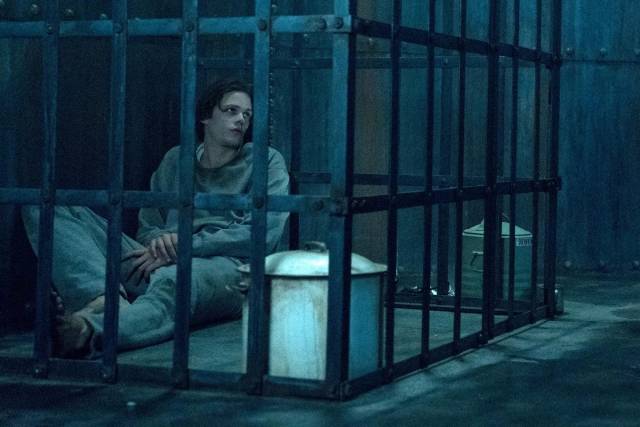 Castle Rock: The Complete Series (Various, 2018-19)
Castle Rock: The Complete Series (Various, 2018-19)
Given Stephen King’s practice of setting so many of his books in the same fictional area of Maine, it seems to make sense to cannibalize the novels and combine bits and pieces into a kind of meta-narrative anchored in the small town of Castle Rock. Produced by the annoying J.J. Abrams, this two-season series is intermittently effective as it creates a new story of its own and shoehorns familiar characters into situations which vaguely recall the original novels. (Several brief featurettes)
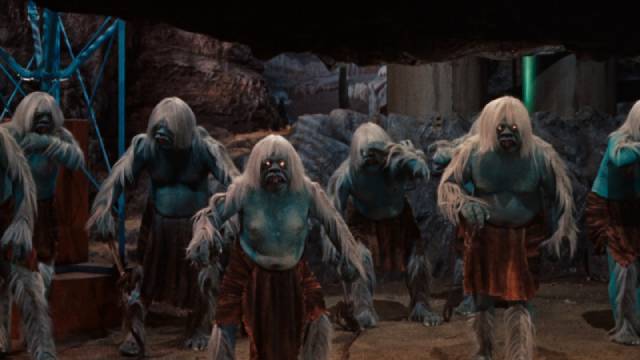 The Time Machine (George Pal, 1960)
The Time Machine (George Pal, 1960)
George Pal’s adaptation of H.G. Wells’ first novel retains its charm, the Edwardian period setting keeping the optical and miniature effects from seeming dated. Wells’ warnings about the destructive potential of modern warfare and the social consequences of economic inequality survive the transition to the screen, even if the tone is more romantic fantasy than Socialist warning. (Archival making-of documentary)
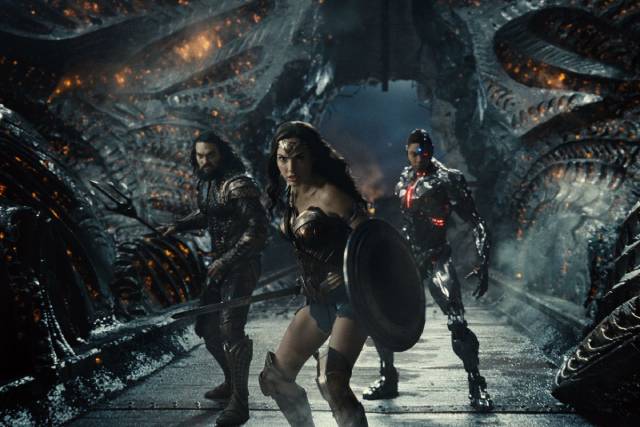 Zack Snyder’s Justice League (Zack Snyder, 2021)
Zack Snyder’s Justice League (Zack Snyder, 2021)
Not having seen the theatrical release of Justice League, I have no opinion on the controversy, but since I have a slight soft spot for some of Zack Snyder’s work, I watched his four-hour director’s cut … and was rather disappointed. A long, rambling series of episodes which slowly gather the various members of the League to create a joint force to confront a big CG bad guy, it seems tonally inconsistent, repetitive and strangely lacking in energy. (Featurette with Snyder talking about his DC movies)
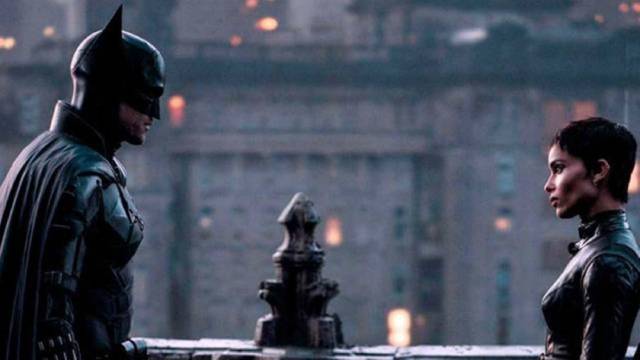 The Batman (Matt Reeves, 2022)
The Batman (Matt Reeves, 2022)
On the other hand, I didn’t expect much from The Batman but ended up really liking it. I picked it up because I liked Matt Reeves’s Planet of the Apes movies, even though Batman is a bit of a bore (particularly in Christopher Nolan’s insufferably self-serious trilogy). Not quite another version of Batman’s origin story, this one goes back to basics – the tone is more ’40s detective comics than ponderous superhero epic, steeped in noir tropes and flawed characters. At almost three hours, it never outstays its welcome. (Deleted scenes and multiple featurettes)
*
Miscellaneous
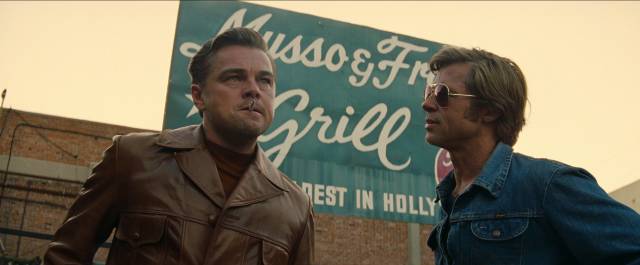 Once Upon a Time in Hollywood (Quentin Tarantino, 2019)
Once Upon a Time in Hollywood (Quentin Tarantino, 2019)
I’m not sure why I finally took a look at this, considering my feelings about Quentin Tarantino, but it was pretty much what I’d expected – smug, self-satisfied and freighted with a numbing amount of toxic masculinity from its contemptuous treatment of Bruce Lee to that revisionist fantasy about an old-time tough guy sorting out the Manson family and saving Sharon Tate – she and her friends apparently died in the real world because they were weak and corrupt, her men friends sapped of male vitality by their decadence. Has Tarantino become increasingly reactionary over the years, or simply less able to couch his retrograde attitudes in an entertaining disguise? (Sony-Columbia dual-format with a bunch of featurettes)
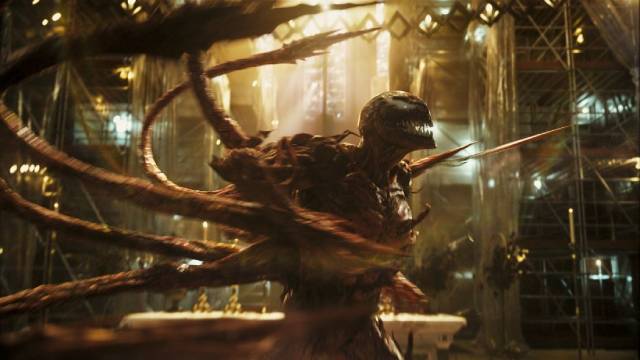 Venom: Let There Be Carnage (Andy Serkis, 2021)
Venom: Let There Be Carnage (Andy Serkis, 2021)
No doubt any credibility I had will be further tarnished by saying that I enjoyed the Venom sequel as much as the original movie – both of which didn’t get much love from either fans or critics. These fringe projects are far more entertaining for me than the mainstream Marvel movies – the larger mythology bores me, but Tom Hardy makes these ephemera a lot of fun. Director Andy Serkis keeps it light and breezy and refreshingly brief. (Sony-Columbia dual-format with outtakes and deleted scenes, plus several featurettes)
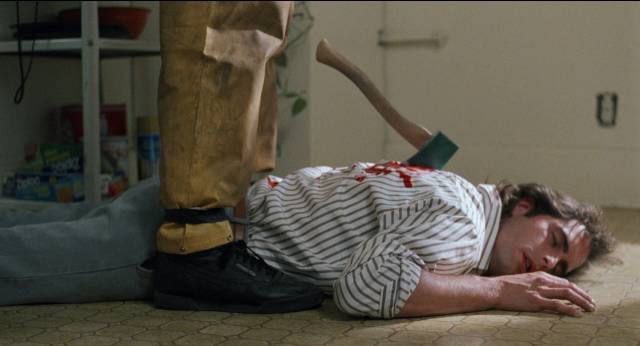 Darkroom (Terrence O’Hara, 1989)
Darkroom (Terrence O’Hara, 1989)
A routine late-period slasher which goes through the motions without any effort at originality. Being set in an under-populated rural area, there aren’t a lot of characters so director O’Hara has to work hard to conceal the killer’s identity as the voyeur with a camera stalks a young woman’s family and friends, picking them off one at a time. (88 Films Blu-ray with a couple of actor interviews)
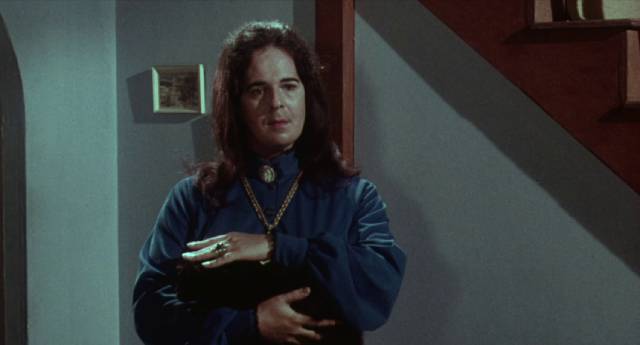 Miss Leslie’s Dolls (Joseph G. Prieto, 1973)
Miss Leslie’s Dolls (Joseph G. Prieto, 1973)
Another entry in the odd exploitation sub-set of transvestite killer movies. A teacher and her three students on a road trip seek shelter during a big storm at a remote house where they’re welcomed in by Miss Leslie, a middle-aged man in a dress who’s dubbed with a woman’s voice – whether in an attempt to fool the audience (unsuccessfully) or … well, I’m not sure what. The identity of the director is a mystery, the pacing extremely slow (star Salvador Ugarte delivers his lines in slow motion, stretching scenes out to absurd lengths), but it has that strange fascination which is a hallmark of slightly perverse regional exploitation movies. (Network Blu-ray with no extras unfortunately)
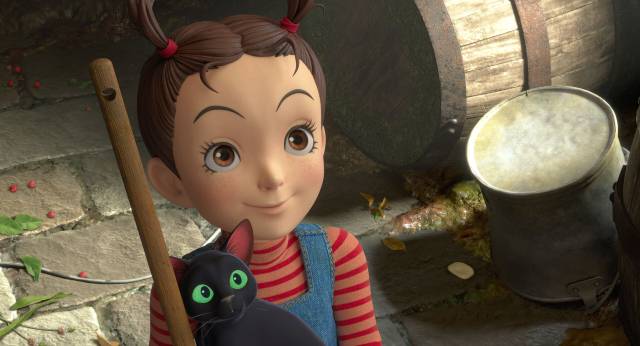 Earwig and the Witch (Goro Miyazaki, 2020)
Earwig and the Witch (Goro Miyazaki, 2020)
The first Studio Ghibli computer-animated feature, from Hayao Miyazaki’s son Goro, is a big disappointment. It lacks the visual delicacy and charm of the studio’s traditional animation, while the story feels truncated and only half-formed, as if intended as the first episode of a series. Based on a book by Diana Wynne Jones, who also wrote the source novel for Howl’s Moving Castle, it’s the story of an orphan who apprentices with a witch as she gradually learns the story of her own background. (GKids Blu-ray with storyboards and a couple of featurettes)
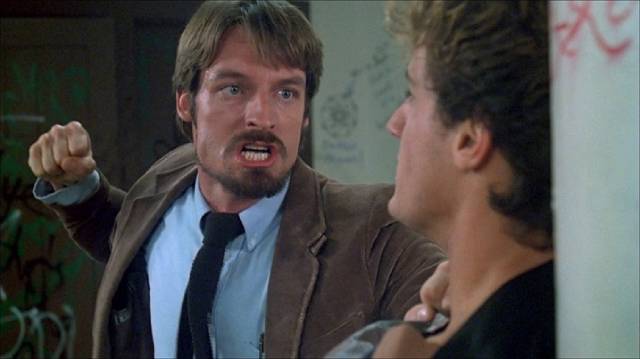 Class of 1984 (Mark L. Lester, 1982)
Class of 1984 (Mark L. Lester, 1982)
An upgrade from the old Anchor Bay DVD. Mark L. Lester’s best movie holds up as a slice of ’80s exploitation in which a dedicated music teacher takes a new position at an inner city school dominated by a violent gang of punks who make his life hell until he finally fights back in protracted, bloody combat through the hallways and classrooms. Unapologetic about vigilantism, it’s one of the best movies in its sub-genre, visceral and satisfying as it plays on the audiences most atavistic tendencies. (Scream Factory Blu-ray with new and archival featurettes and a director commentary)
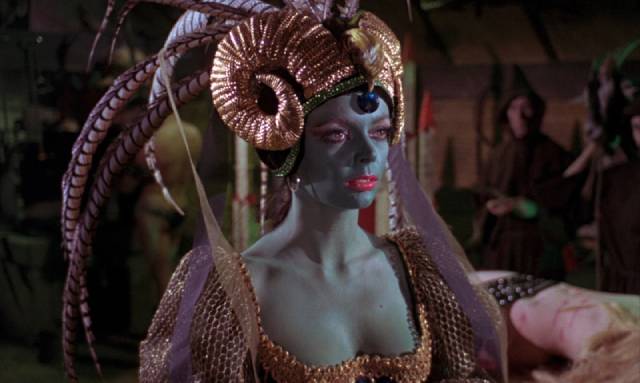 Curse of the Crimson Altar (Vernon Sewell, 1968)
Curse of the Crimson Altar (Vernon Sewell, 1968)
Vernon Sewell was a minor British director whose four-decade career contains little of real note – my favourite is the absurd were-moth Gothic The Blood-Beast Terror (1968), made the same year as this oddity (purported to be a loose adaptation of H.P. Lovecraft’s “Dreams in the Witch House”). It’s a mess, one of those movies with an impressive cast, most of whom turn out to have worked just for an afternoon, appearing in a scene or two while the movie rests on a couple of lesser-known actors. In this case we get Boris Karloff, Christopher Lee, Michael Gough and Barbara Steele (wearing an outrageous outfit) in a tale of family curses and Satanism in a big English country house. A bit dull as a story, it has some very colourful visuals that make it fun to watch. (Screenbound Pictures Blu-ray with a Barbara Steele commentary, Christopher Lee interview and making-of documentary)
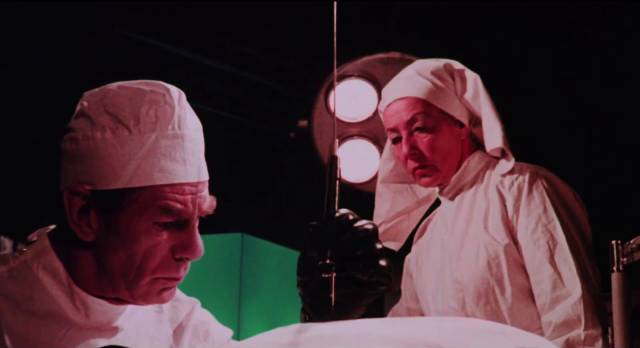 Horror Hospital (Antony Balch, 1973)
Horror Hospital (Antony Balch, 1973)
Production-wise on a par with Crimson Altar, this is the second of two features by Antony Balch, who collaborated with William S. Burroughs on a number of experimental films. That work obviously influenced the appropriately titled Bizarre (1970), but this follow-up is far more conventional, along the lines of the movies Pete Walker was making around the same time. Michael Gough plays a crippled surgeon who runs a weight-loss spa as a front for his sinister experiments in behaviour control through radical brain surgery. There’s some graphic gore – surgery, beheadings – but the tone is more camp than straightforward horror – established early with Dennis Price hamming it up as an agent who sends potential victims to the spa for a “cure”. (Odeon Entertainment Blu-ray with several featurettes and a commentary from veteran producer Richard Gordon)
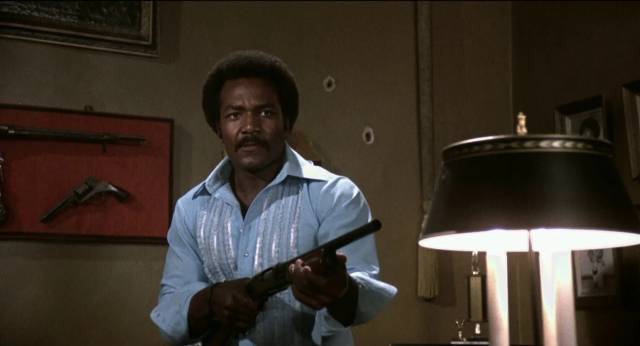 Black Gunn/The Take (Robert Hartford-Davis, 1972/1974)
Black Gunn/The Take (Robert Hartford-Davis, 1972/1974)
Having made similar British horror movies in the ’60s and early ’70s, culminating in Beware My Brethren (1972), Robert Hartford-Davis made an unpredictable move to the States where he directed a pair of blaxploitation movies. Black Gunn (1972), which he also co-wrote, has Black militants robbing a mob gambling joint and triggering a violent war which drags in nightclub owner Jim Brown when his brother is killed. The follow-up The Take (1974) is not as successful, centring on cop Billy Dee Williams who is good at his job, but also happens to rip off the criminals he takes down, something suspected by his boss. Hartford-Davis adapted quite well to an environment and genre very different from what he was previously used to in England and both movies are decent mid-tier blaxploitation. (Bare-bones Mill Creek Blu-ray)
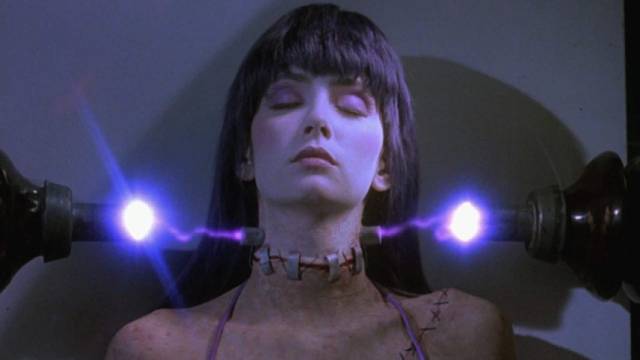 Frankenhooker (Frank Henenlotter, 1990)
Frankenhooker (Frank Henenlotter, 1990)
Frank Henenlotter ditches the grim pulp seriousness of Basket Case and dives headlong into tasteless comic provocation in Frankenhooker (1990). When his girlfriend is chopped up by a remote-controlled lawnmower at a birthday party, Jeffrey Franken saves her head and sets out to rebuild her with parts from the bodies of hookers he kills. Needless to say, when he’s finished it’s not actually his girlfriend who comes to life in the lab. Obviously played more for gross-out comedy than horror, this is Henenlotter’s best film after the original Basket Case. (Synapse Blu-ray with a commentary and multiple featurettes)
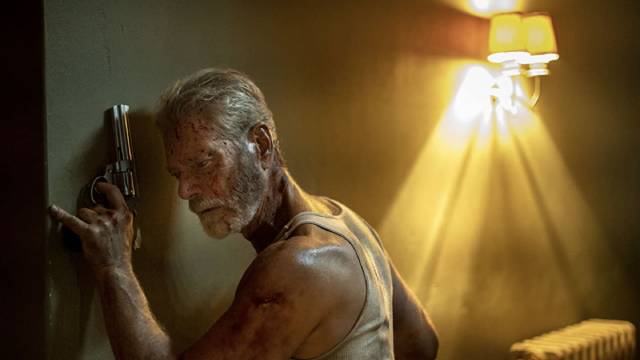 Don’t Breathe 2 (Rodo Sayagues, 2021)
Don’t Breathe 2 (Rodo Sayagues, 2021)
Pointless sequel to the gimmicky original. Now that we know that the blind man is a kidnapper/rapist, the initial viewer sympathy for his fight against home invaders is long gone. So new director Rodo Sayagues and co-writer/producer Fede Alvarez make the new gang of home invaders irredeemably obnoxious in an attempt to make the kidnapper/rapist seem somehow the better option for the 11-year-old girl he has kidnapped and made a replacement for his dead daughter. When all your characters are repulsive, it’s hard to inspire interest in the audience and that remains an insurmountable problem for Sayagues. (Sony Blu-ray with alternate ending, featurettes and a commentary)
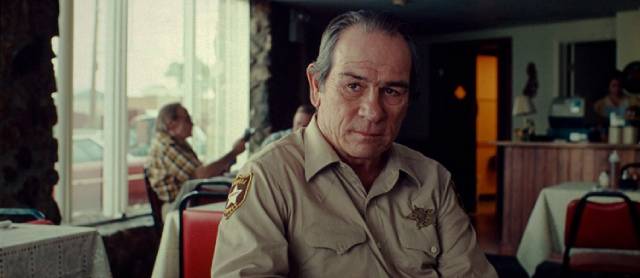 No Country for Old Men (Joel & Ethan Coen, 2007)
No Country for Old Men (Joel & Ethan Coen, 2007)
I have an on-again, off-again relationship with the Coen Brothers – some of their work I love, some irritates me, and some I really dislike. I’m not sure why I decided to re-watch No Country for Old Men (2007) which I hadn’t liked when I saw it in its original run … but watching it again, I discovered that almost everything I remembered was wrong. Fifteen years ago, the narrative had seemed a loose collection of almost random incidents that barely connected with one another. But no, it’s actually quite tightly plotted. Did Tommy Lee Jones’s sheriff really spend all his time sitting in his kitchen reading about the case and pontificating about the bleak meaningless of life? No, he’s out there investigating and trying to rescue Josh Brolin from his bad decisions … and so on. My opinion did a complete one-eighty and I have no idea what made me dislike it so much first time around. (Alliance Blu-ray with a few featurettes)
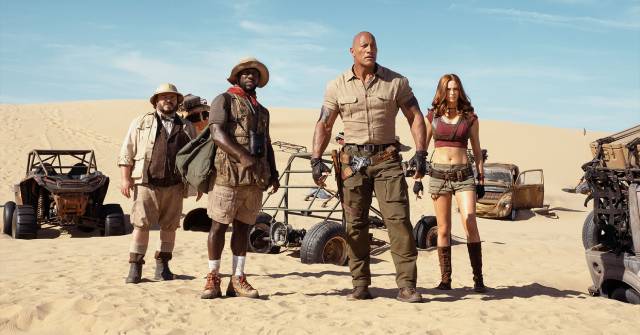 Jumanji: The Next Level (Jake Kasdan, 2019)
Jumanji: The Next Level (Jake Kasdan, 2019)
I really enjoyed Jake Kasdan’s Jumanji: Welcome to the Jungle (2017), which elaborated on the concept of Chris Van Allsburg’s children’s book and Joe Johnston’s 1995 movie starring Robin Williams with wit and a terrific cast. Kasdan and one of the writers are back for the sequel, as are the main members of the cast – Dwayne Johnson, Jack Black, Kevin Hart, Karen Gillen – but something has been lost. This one tries too hard, with bigger action scenes and a lot of body-hopping among the characters – while the cast do some interesting things as they take on each other’s personas, the cumulative effect is slightly alienating as the characters become disconnected from their physical screen presence. Unlike the first movie, this one feels a bit too long and slightly less charming. (Sony Blu-ray with multiple featurettes)
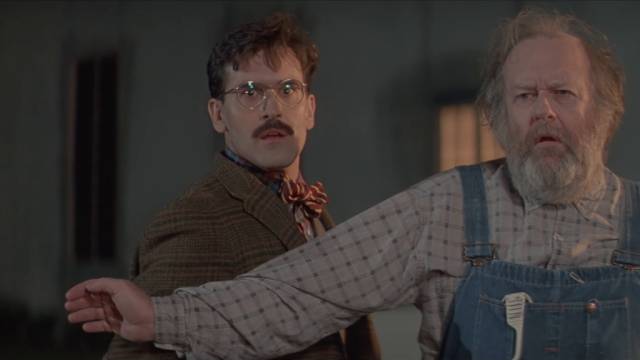 Sundown: The Vampire in Retreat (Anthony Hickox, 1990)
Sundown: The Vampire in Retreat (Anthony Hickox, 1990)
I’d previously only seen Anthony Hickox’s Hellraiser III: Hell on Earth (1992) before picking this up. Sundown is more entertaining than Pinhead’s third outing, which merely uses visual ideas from Clive Barker’s original without really residing in Barker’s twisted imaginary world. In a small southwestern town, Count Mardulak (David Carradine) tries to atone for centuries of blood-drinking by forging a new way of life for his vampire subjects. They use heavy sunscreen so they can walk about in daylight, and there’s research going on to perfect synthetic blood. But there’s unrest in the community among those who like the old ways (echoing the community and its conflicts in Joe Dante’s The Howling [1981]). Things come to a head with the arrival of David Harrison and his wife; he’s been hired to get the artificial blood factory up and running without realizing what’s really going on until the angry rebels rise up to take over. A western-vampire-comedy hybrid, Sundown doesn’t quite fulfill its promise, but it has some entertaining ideas, plus Bruce Campbell. (Lionsgate/Vestron Blu-ray with commentary and numerous interview featurettes)
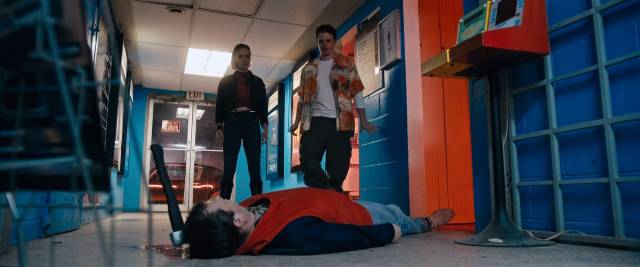 Vicious Fun (Cody Calahan, 2021)
Vicious Fun (Cody Calahan, 2021)
A Canadian horror-comedy which fumbles a couple of its ideas, but mostly works really well. An annoying movie fan/journalist inadvertently finds himself locked after hours in a Chinese restaurant where a self-help group is having a session. Mistaken for a missing member due for his first meeting, he tries to fake his way through the session until he realizes that their shared problem is that they’re all serial killers. And among them is a female serial killer who, like Dexter, is on a mission to kill other killers. Co-writer/director Cody Calahan maintains a fine balance between tension, gore and character comedy … my only real quibble being that our protagonist doesn’t really make much use of his encyclopedic movie knowledge to navigate his way through the situation. (Black Fawn Blu-ray with commentary, deleted and alternate scenes, and a couple of featurettes)
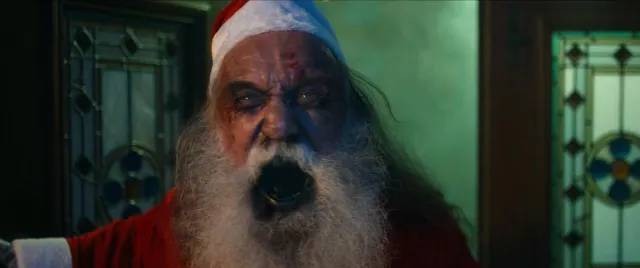 Deathcember (Various, 2019)
Deathcember (Various, 2019)
A horror Advent calendar, this collection of twenty-four short films by directors from around the world is pretty much like all such anthologies – ABCs of Death and the like – with some gore, some comedy, some disturbingly transgressive moments, all of which pass quite quickly on the way to the next. The thematic connection to Christmas is tenuous, and quite a few of the shorts are little more than tasteless gags, though a couple stand out – particularly a piece of stop-motion which uses Catholic iconography to horrific effect. (Raven Banner Blu-ray with numerous interview featurettes)
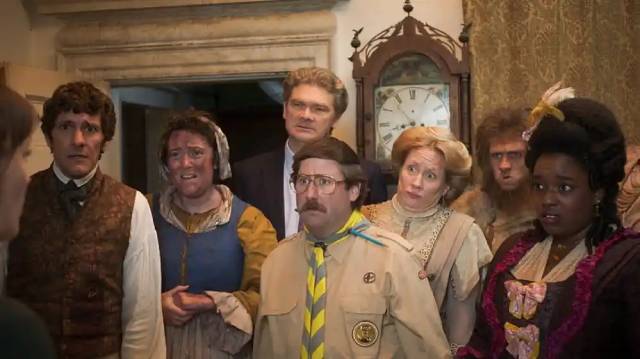 Ghosts: Series 1 & 2 (Tom Kingsley, 2019-20)
Ghosts: Series 1 & 2 (Tom Kingsley, 2019-20)
Like any sit-com, Ghosts adheres to certain formulaic narrative tropes – confusion arising from misunderstandings, characters doing dumb things and then having to deal with the consequences, all leading towards some kind of reconciliation – but the show’s original elements frequently manage to overcome those limitations. A young couple inherit a run-down country estate and instead of immediately selling it decide to renovate and turn it into a bed-and-breakfast. But when the wife gets a concussion, she can suddenly see all the resident ghosts, a bickering collection of men and women who died on the grounds in various different periods going back to the Stone Age. All trapped together, they’re bored and always getting on each other’s nerves … and the couple have to deal with them as they try to fix the place up. The wide range of character types, played by a talented cast with excellent comic skills, keeps it lively and the ghostly effects are handled with great technical skill. (BBC DVDs with a few very brief featurettes on the first season disk and nothing on the second)
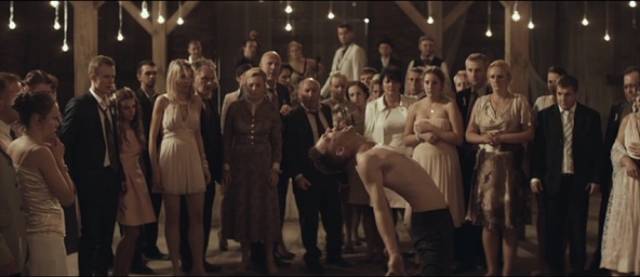 Demon (Marcin Wrona, 2015)
Demon (Marcin Wrona, 2015)
A wedding at an old farm in Poland is disrupted when the groom is possessed by the spirit of a murdered woman buried on the grounds. An updating of the Jewish Dybbuk legend, Marcin Wrona’s creepy film deals with contemporary social unease (the bride’s parents are unhappy with her choice of a foreign husband) which is amplified and complicated by a history which erupts during the celebration – the return of the repressed in the form of a murdered Jewish woman determined to regain some kind of life through an unwilling surrogate. (Bare-bones DVD from Sharp Teeth Films)
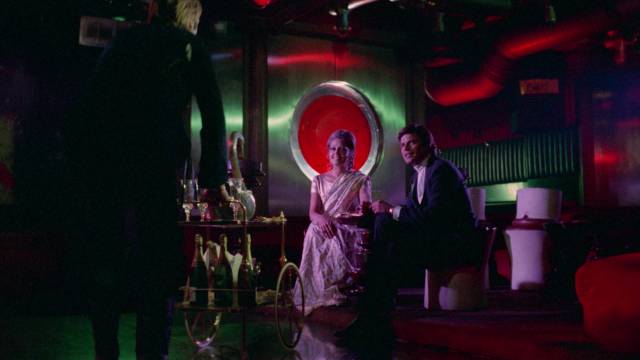 The Fox with a Velvet Tail (Jose Maria Forque, 1971)
The Fox with a Velvet Tail (Jose Maria Forque, 1971)
An Italo-Spanish giallo set in a villa overlooking the Mediterranean, with languid sunshine concealing human duplicity. With her marriage collapsing, Ruth (Analia Gade) leaves her husband in Paris and heads for their villa with new lover Paul (Jean Sorel). The casting of Sorel immediately raises flags, but she basks in his attention. Soon another woman shows up in a nearby lodge, watching the villa with more than casual interest, and then husband Michel (Tony Kendall) arrives, seemingly fine with Ruth and Paul’s affair. Then the accidents start and Ruth begins to feel paranoid – with good reason, it turns out. There’s a nice twist as the seemingly helpless heroine manipulates the situation to fight back without her persecutors realizing until it’s too late. (Mondo Macabro Blu-ray with Troy Howarth commentary, alternate scenes and an episode of the Eurotika! TV series which interviews several actresses with prominent giallo careers)
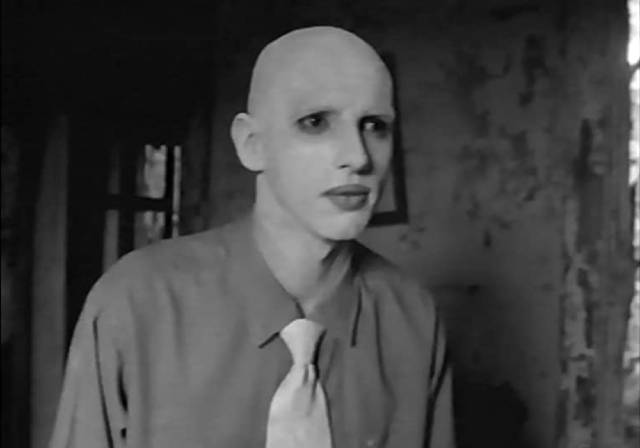 The Cornshukker (Brando Snider, 1997)
The Cornshukker (Brando Snider, 1997)
A real oddity which at times seems like a student film goof, at times an absurdist experiment in rural surrealism. A strange, mythic character lives in a derelict farmhouse, eating (and pissing) corn, and fending off an encroaching horde of crawdads while enduring a series of unwanted visitors – a reporter from the local paper who wants to know something about this mythical creature who is distrusted by his neighbours, a girl scout selling cookies, a man looking for his missing dog (it’s inside the house), a crazy pizza delivery guy, a couple of musicians and a preacher. A series of sketches which gradually reveals itself to be about conformity and difference and prejudice giving rise to violence (towards the end a lynch mob shows up). More strange than funny or conventionally entertaining, it ultimately lacks a coherent sense of purpose, though Jason Snider (the director’s brother) sustains an interesting look with his shaved head and awkward body language, occasionally distorted with some video effects. (VHShitfest Blu-ray with director commentary and a brief on-camera interview covering the $6000 production, plus a music video)
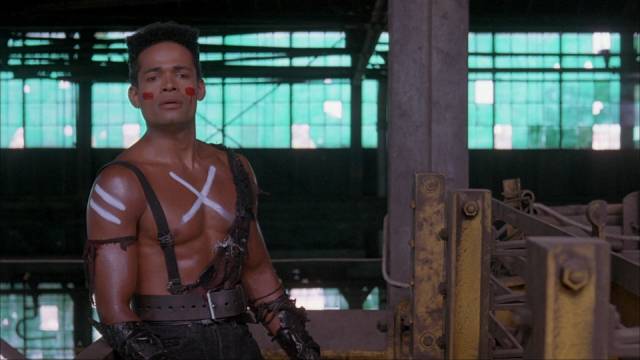 Exterminator 2 (Mark Buntzman, 1984)
Exterminator 2 (Mark Buntzman, 1984)
This sequel to James Glickenhaus’s movie about a Vietnam vet cleaning up the streets of NYC sees John Eastland (Robert Ginty) going head to head with X (Mario Van Peebles) and his gang. Personal acts of revenge lead to escalating mayhem involving Eastland’s signature flamethrower and machine guns mounted on a garbage truck. Neither film is in the top ranks of vigilante cinema, but the personalized conflict between Eastland and X gives this one a bit more interest than the usual pattern of random bad guys being knocked off like targets in a shooting gallery. (Shout! Factory Blu-ray with commentary)
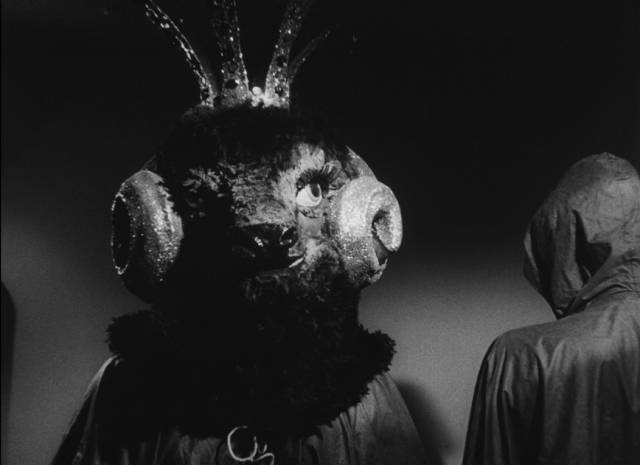 The Satanist/Sisters in Leather (Zoltan G. Spencer, 1968/1969)
The Satanist/Sisters in Leather (Zoltan G. Spencer, 1968/1969)
Another oddity, this one stumbled on in a used record store (a bargain it turns out as copies of the out-of-print disk go for $150 or more on eBay). An exploitation double-feature from the improbably named Zoltan G. Spencer, both movies mix long tedious stretches and soft-core scenes focused on bare breasts as they tell very slight stories. In The Satanist, a writer recovering from a breakdown retreats with his wife to the country where he discovers that his neighbour is the woman he’s been dreaming about; it turns out she’s the head of a coven and a dinner invitation turns into a black mass complete with nude cavorting and a man wearing a goat head. Sisters in Leather has a philandering husband blackmailed by lesbian bikers who try to recruit his wife into their gang. Both movies are surprisingly well-shot in moody black-and-white, with 4K transfers which probably make them look better than they ever did on a grindhouse screen. (Garagehouse Pictures Blu-ray with commentary by Chris Poggiali and Ashley West on The Satanist)
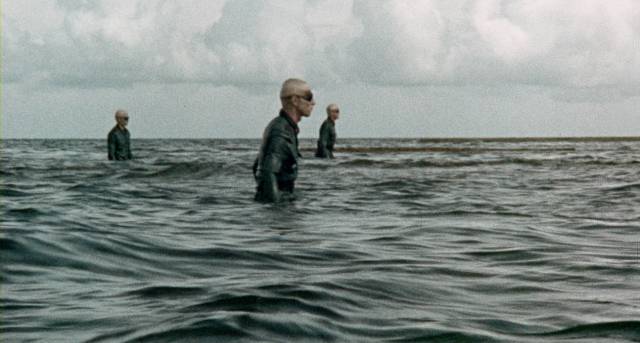 Shock Waves (Ken Wiederhorn, 1977)
Shock Waves (Ken Wiederhorn, 1977)
I have to admit that Shock Waves, one of the key Nazi zombie movies, seemed a bit too restrained for me as I watched Blue Underground’s Blu-ray upgrade from their twenty-year-old DVD. The image is much improved, though still reflects the movie’s low-budget with pronounced film grain and occasional softness. A group of people out on a cruise (under captain John Carradine) run into a mysterious derelict ship in the middle of the night and end up on a seemingly uninhabited island. As they explore, they come across a huge old hotel whose sole resident is Peter Cushing with a German accent. It turns out he’s a former SS officer and the derelict, sunk at the end of the war, was carrying the fruits of his work creating an undead army. The zombie soldiers live under water, rising to drag unwary people under. Although there’s some effectively creepy atmosphere, the zombies themselves are underwhelming, spending most of their time just rising slowly out of the water, which looks neat the first couple of times but quickly becomes repetitive and not very menacing. (Blue Underground Blu-ray with commentary and a collection of interview featurettes)
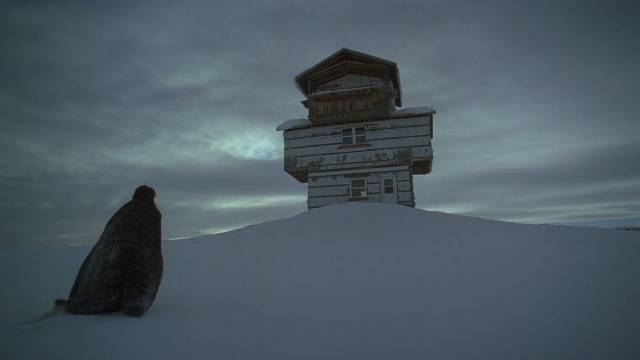 The Lodge (Veronika Franz & Severin Fiala, 2019)
The Lodge (Veronika Franz & Severin Fiala, 2019)
I still haven’t seen Goodnight Mommy (2014), the first feature by co-writer/directors Veronika Franz and Severin Fiala, but because of Franz’s long association with Ulrich Seidl, with whom she collaborated on a number of scripts, I probably had inflated expectations about their second feature, The Lodge (2019), which I found unsatisfying – though I’m not entirely sure why. The cast is good, it has a moody, ominous atmosphere, but it never really came together for me and I think it’s because of a key narrative element which remains implausible. After their mother commits suicide because their father left her for a younger woman, two brooding children find themselves stuck in a snowbound cabin with their prospective stepmother. A series of disturbing events lead inexorably to a grim conclusion. My problem lies with the younger woman, Grace (Riley Keough), and her relationship with the father Richard (Richard Armitage). Grace is the severely psychologically damaged sole survivor of a cult which committed mass suicide and is so obviously unstable that his attachment to her seems creepy in a way which may not be intended by the filmmakers. His irresponsibility in leaving this fragile woman alone with two very hostile adolescents makes what ensues seem contrived rather than organically unsettling. (Bare bones VVS Films Blu-ray)
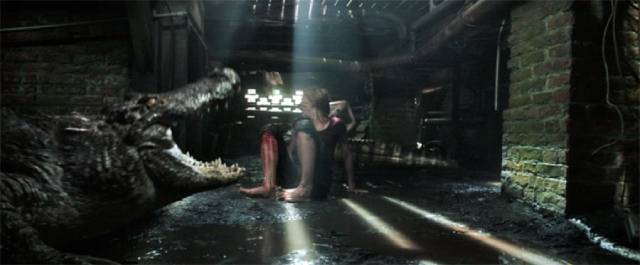 Crawl (Alexandre Aja, 2019)
Crawl (Alexandre Aja, 2019)
I’m not a fan of Alexandre Aja, a slick and facile maker of ersatz genre movies. I disliked the overrated Haute Tension (2003), his dreadful remakes of The Hills Have Eyes (2006) and Piranha (2010), the risible Horns (2013) … but I do enjoy a deadly critter movie, so I took a chance on Crawl (2019), in which estranged daughter Haley (Kaya Scodelario) goes looking for her father, Dave (Barry Pepper), who’s stuck in a small town during a hurricane with the waters rapidly rising. As they bicker about their troubled family history, they’re cornered in a flooded basement by some very large and mean alligators. Writers Michael Rasmussen and Shawn Rasmussen specialize in pulpy horror (the only film written by them that I’ve seen is John Carpenter’s final feature to date, The Ward [2010], a decent enough little horror). Crawl has the ambience of a made-in-studio movie, its setting almost as artificial as Tobe Hooper’s Eaten Alive (1976), though it naturally uses CGI monsters instead of a big animatronic beast. Everything is pretty formulaic, but the situation itself generates some tension and Scodelario and Pepper give game performances even as they implausibly carry on despite savage ‘gator bites. (Deleted and extended scenes, animated storyboard alternate opening, plus making-of featurettes)
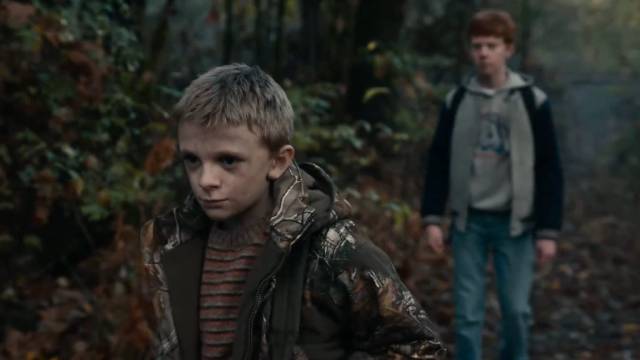 Antlers (Scott Cooper, 2021)
Antlers (Scott Cooper, 2021)
Like the only previous Scott Cooper movie I’ve seen, Out of the Furnace (2013), Antlers (2021) tries to use genre elements to illuminate and comment on the plight of people struggling to survive as a changing economy leaves them behind. In Furnace he hung his rust-belt narrative on crime-revenge tropes; in Antlers, he goes for supernatural horror and once again the mix never really gels. A woman (Keri Russell) returns to a small, dying Oregon town to take up a teaching position and confront long-buried childhood trauma. She has an uneasy relationship with her brother (Jesse Plemmons), who remained in town and became sheriff, but her main concern is a silent, troubled boy in her class. As she digs into this boy’s life, she gradually discovers the layers of horror on which the community rests – poverty, addiction, abuse … and somehow underlying it all, the angry Wendigo which is striking back against those who have exploited and damaged the land. The economic horrors are sufficient for the drama, the addition of a supernatural threat merely gilding the lily and trivializing the very real problems such a community faces. (Fox Searchlight Blu-ray with multiple featurettes)
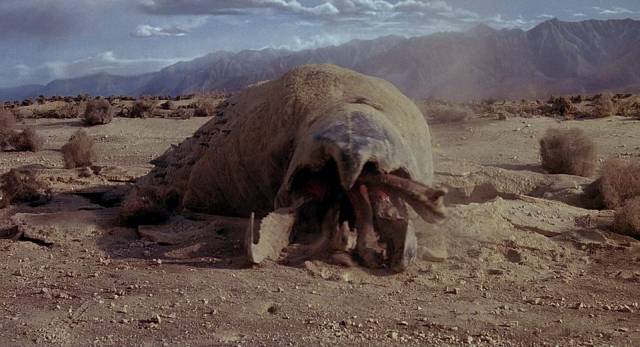 Tremors Attack Pack (Various, 1990-2004)
Tremors Attack Pack (Various, 1990-2004)
Like bingeing on junk food, I re-watched the four original Tremors movies in quick succession. Ron Underwood’s original (1990) remains a fun monster movie with buddy comedy overlay as bickering friends Val (Kevin Bacon) and Earl (Fred Ward) find themselves trying to protect a small desert town from giant predatory worms – with the pre-CGI monsters impressively created as physical effects on-set. S.S. Wilson’s sequel (2006) drops Val and has Earl as an almost-forgotten celebrity who is approached by an oil company representative hoping to make use of his expertise to rid a Mexican oil field of a new infestation. More than ever he needs the help of heavily-armed survivalist Burt Gummer (Michael Gross). Burt takes centre stage in Brent Maddock’s number three (2001), returning to the original small desert town where the worms are now mutating into more dangerous forms (they grow legs and eventually begin to fly). With Ward also departed, Gross becomes the star and takes a key role in number four (2004), again directed by Wilson. This is a prequel set in the old West, with a silver mine inadvertently releasing the first worms, apparently dormant since prehistoric times. Gross plays Burt’s ancestor Hiram, a somewhat effete easterner sent to sort out the trouble at the mine and pull the diverse community together (white settlers, Native Americans, Chinese immigrants). The series is fairly consistent thanks to the on-going presence of Wilson and Maddock as both writers and directors, though diminishing budgets and the increasing replacement of practical effects by CGI make the later episodes seem more like what they are – quick made-for-video cash-ins. (Two-disk Blu-ray set from Universal with most of the extras devoted to the first movie – a commentary and several featurettes)
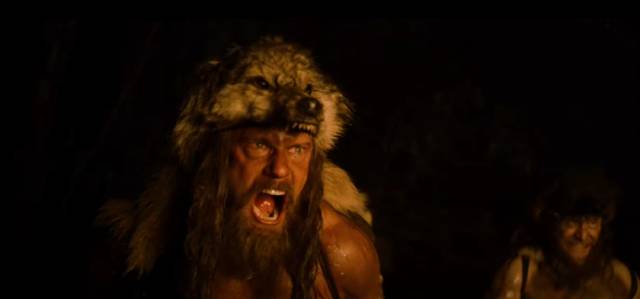 The Northman (Robert Eggers, 2022)
The Northman (Robert Eggers, 2022)
Having heard mixed things, I didn’t rush to see Robert Eggers’ third feature, although I loved The Witch (2015) and found The Lighthouse (2019) fascinating if impenetrable. The Northman (2022), Eggers and his collaborators claim, is the most authentic Viking movie ever made – and yet, unlike the strangely mysterious works which preceded it, both of which convincingly immerse the viewer in worlds rooted in times very different from our own, The Northman feels very much like a movie to me, not a glimpse of another world. Maybe it’s Alexander Skarsgard’s beefed up physique which looks like a Frank Frazetta Conan cover; for all its grim, humourless view of a world shaped by violence, slavery and endless cycles of murder and revenge, the film seems more firmly rooted in the sword-and-sorcery genre than actual history. Stripped of Shakespeare’s literary art, the story of Hamlet – here Amleth – is blunt and alienating. As a boy he sees his father slaughtered by his uncle and his men and his mother carried off. Escaping, he grows to be a mighty Viking warrior raiding Rus for slaves (including a woman [The Witch’s Anya Taylor-Joy] who eventually becomes his love interest in a very movie-ish turn). Though his return to his family in the guise of a slave eventually reveals the truth behind what he saw as a child, which undermines his sense of honour and obligation, he can’t stop himself from following through with his vengeance. Despite a fine cast and the gorgeous primal landscapes of Iceland, The Northman is a chilly exercise which never engages on an emotional level nor really, for that matter, on an intellectual level. As an “authentic depiction of Vikings”, I prefer Nicolas Winding Refn’s Valhalla Rising (2009). (Universal Blu-ray with commentary, deleted and extended scenes and several featurettes)
Comments